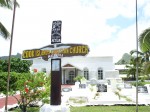With this first text of presentation, I am beginning to build the English side of this blog. It may be not perfect, as you can guess English is not my mother tongue, but I hope it can be useful to those interested in these matters.
 The islands of Polynesia are located in a triangle whose three corners are New Zealand (South), Rapa Nui also called Easter Island (East) and Hawaii (North). French Polynesia is roughly at the centre of this triangle and is made of five archipelagos: The Windward Islands (Tahiti and Moorea), the Leeward Islands (the most famous being Bora Bora), the Austral Islands, the Tuamotu-Gambier and the Marquesas.
The islands of Polynesia are located in a triangle whose three corners are New Zealand (South), Rapa Nui also called Easter Island (East) and Hawaii (North). French Polynesia is roughly at the centre of this triangle and is made of five archipelagos: The Windward Islands (Tahiti and Moorea), the Leeward Islands (the most famous being Bora Bora), the Austral Islands, the Tuamotu-Gambier and the Marquesas.
Those who know contemporary Polynesia and more widely Oceania, know how essential is the place of Christianity in these societies. This is obviously not what the tourism industry chooses to sell destinations like Tahiti, even if one can see every Sunday morning some tourists – on the advice of their guides – attending the services of the Protestant Churches in French Polynesia, Cook Islands or elsewhere to hear the traditional hymns. Until recently, the Oceanists haven’t seen Christianity either as a valuable object of study, considering it as a fatal danger for local cultures or preferring to ignore it in order to focus on what seemed to have “resisted” or what was going to be shortly erased from memories.
The subject of this blog is Polynesia of today, that has been Christian for more than 100 years, and more specifically the last wave of Christianity in Polynesia: Evangelical and Pentecostal Protestants, who are experiencing since the 80’s a rapid growth, mainly at the expense of the Historical Protestant Churches.
Speaking about Polynesia of today means to take into account the 232000 Pacific people living in New Zealand, Samoans, Tongans, Cook Islanders (more numerous in New Zealand than in their country of origin), Tuvaluans, Niueans… Auckland is the Capital of this Polynesian Diaspora, concentrated in the South suburbs of Otara and Mangere. Polynesia is nowadays also urban: 53% of the inhabitants of French Polynesia are living in town, 48% in the American Samoa, 32% in Tonga.
The choice of Polynesia as a field of research is not a way to escape from the strong currents of the contemporary word to take refuge in the quiet lagoons of exotic paradises. It is a way to understand evolutions of Christianity whose scale and consequences are still largely unknown: the worldwide expansion of Evangelicals and Pentecostals, the rise of new missions from Africa, Asia and Oceania that aim to re-evangelize the Western countries… among other things.
 The islands of Polynesia are located in a triangle whose three corners are New Zealand (South), Rapa Nui also called Easter Island (East) and Hawaii (North). French Polynesia is roughly at the centre of this triangle and is made of five archipelagos: The Windward Islands (Tahiti and Moorea), the Leeward Islands (the most famous being Bora Bora), the Austral Islands, the Tuamotu-Gambier and the Marquesas.
The islands of Polynesia are located in a triangle whose three corners are New Zealand (South), Rapa Nui also called Easter Island (East) and Hawaii (North). French Polynesia is roughly at the centre of this triangle and is made of five archipelagos: The Windward Islands (Tahiti and Moorea), the Leeward Islands (the most famous being Bora Bora), the Austral Islands, the Tuamotu-Gambier and the Marquesas.Those who know contemporary Polynesia and more widely Oceania, know how essential is the place of Christianity in these societies. This is obviously not what the tourism industry chooses to sell destinations like Tahiti, even if one can see every Sunday morning some tourists – on the advice of their guides – attending the services of the Protestant Churches in French Polynesia, Cook Islands or elsewhere to hear the traditional hymns. Until recently, the Oceanists haven’t seen Christianity either as a valuable object of study, considering it as a fatal danger for local cultures or preferring to ignore it in order to focus on what seemed to have “resisted” or what was going to be shortly erased from memories.
The subject of this blog is Polynesia of today, that has been Christian for more than 100 years, and more specifically the last wave of Christianity in Polynesia: Evangelical and Pentecostal Protestants, who are experiencing since the 80’s a rapid growth, mainly at the expense of the Historical Protestant Churches.
Speaking about Polynesia of today means to take into account the 232000 Pacific people living in New Zealand, Samoans, Tongans, Cook Islanders (more numerous in New Zealand than in their country of origin), Tuvaluans, Niueans… Auckland is the Capital of this Polynesian Diaspora, concentrated in the South suburbs of Otara and Mangere. Polynesia is nowadays also urban: 53% of the inhabitants of French Polynesia are living in town, 48% in the American Samoa, 32% in Tonga.
The choice of Polynesia as a field of research is not a way to escape from the strong currents of the contemporary word to take refuge in the quiet lagoons of exotic paradises. It is a way to understand evolutions of Christianity whose scale and consequences are still largely unknown: the worldwide expansion of Evangelicals and Pentecostals, the rise of new missions from Africa, Asia and Oceania that aim to re-evangelize the Western countries… among other things.
(Photo : the Protestant Temple of Matavera, Cook Islands Christian Church, Rarotonga. Copyrights G. Malogne-Fer)